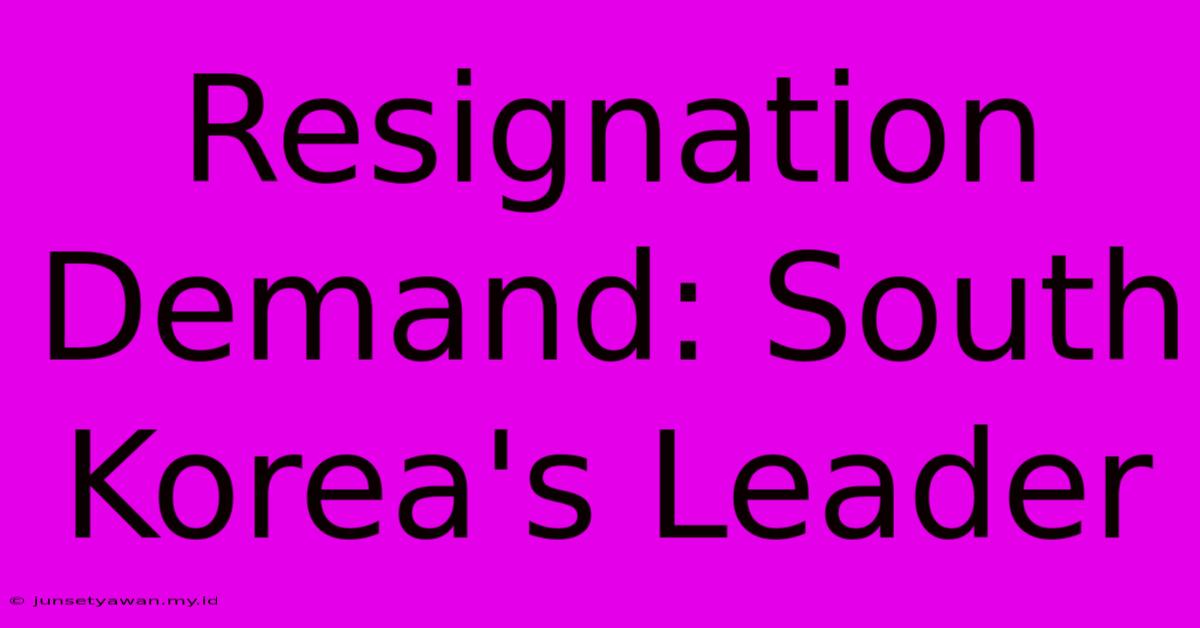Resignation Demand: South Korea's Leader

Temukan informasi yang lebih rinci dan menarik di situs web kami. Klik tautan di bawah ini untuk memulai informasi lanjutan: Visit Best Website meltwatermedia.ca. Jangan lewatkan!
Table of Contents
Resignation Demands Rock South Korea: The Pressure Mounts on President Yoon Suk-yeol
South Korea's political landscape is currently dominated by escalating calls for President Yoon Suk-yeol's resignation. The demand for his resignation stems from a confluence of factors, including controversies surrounding his administration's handling of various economic and social issues, alongside accusations of ethical lapses and a decline in public approval ratings. This article delves into the key reasons behind the widespread calls for the President's resignation, examining the political climate and its potential consequences.
Key Factors Fueling the Resignation Demands
Several crucial events and controversies have fueled the intense pressure for President Yoon's resignation. These include:
Economic Hardship and Public Discontent
The South Korean economy has faced significant challenges recently, leading to widespread public discontent. High inflation, rising living costs, and youth unemployment have contributed to a sense of disillusionment among citizens. Critics argue that the government's economic policies haven't effectively addressed these issues, further fueling the demand for the President's resignation. Many believe a change in leadership is necessary to steer the country towards economic recovery.
Allegations of Corruption and Ethical Lapses
Multiple allegations of corruption and ethical misconduct within the President's administration have also significantly contributed to the calls for resignation. These accusations, though some still under investigation, have eroded public trust and damaged the President's credibility. The lack of transparency and perceived attempts to cover up these controversies have further intensified the demand for accountability, culminating in widespread calls for his resignation.
Plummeting Approval Ratings
President Yoon's approval ratings have consistently plummeted since he took office. This drastic decline reflects the growing dissatisfaction with his leadership and handling of critical national issues. The consistently low approval ratings underscore the depth of public discontent and provide further impetus to the calls for his resignation. This sustained low approval is a clear indicator of the widespread desire for a change in leadership.
Political Ramifications and Future Outlook
The ongoing pressure for President Yoon's resignation has significant political ramifications. The opposition parties are actively exploiting the situation, using the controversies and public discontent to further their political agendas. The resulting political instability could have far-reaching consequences for South Korea's domestic and foreign policies. The situation remains fluid, with the possibility of further protests and political maneuvering in the coming weeks and months. The future of the Presidency hangs in the balance, making this a pivotal moment in South Korean politics. The outcome of this political pressure will significantly shape the future direction of the country. Whether the President will eventually succumb to the relentless pressure for resignation remains to be seen.
Meta Description: South Korea's President Yoon Suk-yeol faces mounting calls for resignation amid economic woes, corruption allegations, and plummeting approval ratings. Learn more about the crisis.
(Note: This article is for informational purposes only and does not express any personal opinion or take a stance on the issue. For the latest updates and verified information, refer to reputable news sources.)

Football Match Schedule
Upcoming Matches
Latest Posts
Terimakasih telah mengunjungi situs web kami Resignation Demand: South Korea's Leader. Kami berharap informasi yang kami sampaikan dapat membantu Anda. Jangan sungkan untuk menghubungi kami jika ada pertanyaan atau butuh bantuan tambahan. Sampai bertemu di lain waktu, dan jangan lupa untuk menyimpan halaman ini!
Kami berterima kasih atas kunjungan Anda untuk melihat lebih jauh. Resignation Demand: South Korea's Leader. Informasikan kepada kami jika Anda memerlukan bantuan tambahan. Tandai situs ini dan pastikan untuk kembali lagi segera!
Featured Posts
-
Rossoneri Bantai Sassuolo 6 0
Dec 04, 2024
-
Presidents Resignation South Korea
Dec 04, 2024
-
Standard Genk Voorspelling Opstelling
Dec 04, 2024
-
Neuer Blunder Bayern Takluk Leverkusen
Dec 04, 2024
-
Raphinha Incar Gol Barcelona Jumpa Mallorca
Dec 04, 2024
